#open society
Photo
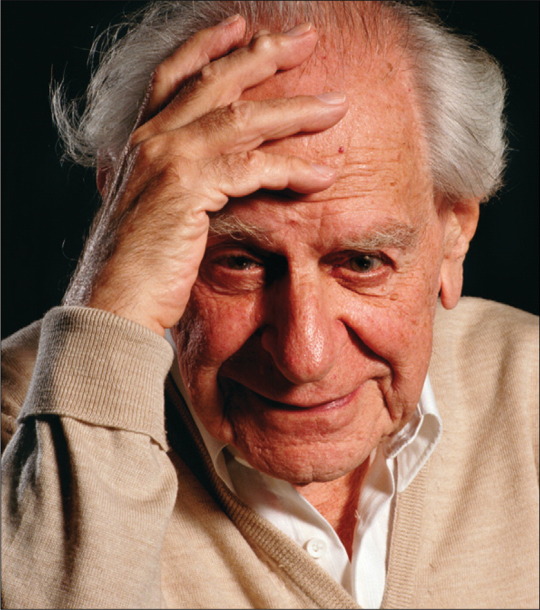
Why do all these social philosophies support the revolt against civilization? And what is the secret of their popularity? Why do they attract and seduce so many intellectuals? I am inclined to think that the reason is that they give expression to a deepfelt dissatisfaction with a world which does not, and cannot, live up to our moral ideals and to our dreams of perfection. The tendency of historicism (and of related views) to support the revolt against civilization may be due to the fact that historicism itself is, largely, a reaction against the strain of our civilization and its demand for personal responsibility.
- Karl Popper, The Open Society and Its Enemies - Vol 1: The Spell of Plato
#popper#karl popper#quote#philosophy#open society#civilisation#philosopher#society#perfection#abrogation of responsibility#historicism
66 notes
·
View notes
Text
“In 1941, whether liberal societies could endure despite their weaknesses was a more than theoretical question. Strauss’s lecture addressed the long-standing question of how liberal societies might protect the virtues they need but often struggle to cultivate, and sometimes actively undermine. And his answer, offered in defense of what he called the “open society” (a term Karl Popper would put to different use four years later), was provocative. He argued that many virtues essential to liberalism are best understood in the moral traditions that are most opposed to liberalism. He also suggested that the vices most threatening to liberal societies are often nurtured by liberal ideals themselves. As was his style, Strauss suggested, rather than explicated, his thesis: An open society requires strengthening by moral and political imaginations that have been formed in closed societies.
Strauss’s lecture bore the solemn title “German Nihilism”—slightly misleading, since its focus was broader than Germany and deeper than nihilism. Strauss was horrified by National Socialism, and he closed his lecture by expressing his admiration for Churchill and his gratitude toward British combatants. But what most engaged his attention was not contemporary statesmen and soldiers, but a previous generation of teachers and students. Strauss worried that the mistakes made by progressive educators in the decades prior to the rise of National Socialism could be made again, endangering the stability of Western democracies.
Strauss opened with a claim that may be unsettling, even when considered in context. He expressed his regret that National Socialism had been identified with nihilism, a philosophical doctrine whose political goals were said to be purely destructive. His concern was not that Hitler’s regime had been denied a fair hearing among intellectuals. For Nazi ideology Strauss expressed only the severest contempt, and with the interesting exception of Ernst Jünger’s early work, he dignified no contemporary German writer with a citation. Nor did Strauss suggest that the regime’s goals were less barbaric in theory than they were proving to be in practice.
Strauss’s concern was that the brutality of the regime evoked strenuous moral responses that impaired philosophical thinking and historical judgment. The regime posed an obvious threat to its victims and to those resisting its advance on two continents by force of arms. But Strauss argued that it posed a less obvious and potentially more enduring threat to those opposing it by intellectual means. Authoritarianism clouded the thinking of some of its most trenchant opponents, making it difficult for them to understand critiques of modernity as anything other than the “ravings” of the vulgar, the provincial, and the stupid. Strauss lamented that a political movement whose lasting defeat required the deepest philosophical wisdom had, in too many cases, elicited something else. It had given defenders of democracy, among whom Strauss included himself, the opportunity to demonize liberalism’s critics as “gangsters,” “mentally diseased,” or “morbid.”
Strauss was not alone in wishing for a deeper understanding of the intellectual roots of European illiberalism. In the same semester, a young John Rawls published his first essay, a sympathetic reading of Oswald Spengler’s predictions of democratic decline. But Strauss’s worry was distinctive of him and his pedagogy, which would play an increasingly important role in American conservatism after his move to the University of Chicago in 1949. Strauss worried that Western thinkers were no longer capable of contemplating perspectives beyond liberalism, even against liberalism, from which to judge the present. Far from constituting a threat to clear thinking, such a perspective is essential to it—for only outside the open society can we identify its virtues and its vices, and gain the strength to endure its discontents. But if we are to reach this horizon, Strauss argued, a popular prejudice often directed against critics of liberalism must be rejected. For what is mislabeled “nihilism” is not a destructive doctrine at all. It is a protest on behalf of something of the highest human importance—something liberalism dismisses at its peril.
(…)
Strauss’s portrait of his classmates was unsparing, but not disdainful. Strauss described young men full of vehement certainty about what they rejected, but inarticulate and unreflective about what they affirmed. “The prospect of a pacified planet, without rulers and ruled,” he observed, “was positively horrifying to [them].” Strauss lamented that their passions found no outlet other than the crudest propaganda. Unable to understand or express themselves in any other way—Strauss noted that they had largely rejected Christian belief—they gave voice to savage forms of group identity. The mark of barbarism, Strauss explained, was the belief that truth and justice should be defined in terms of ethnic or racial membership.
But Strauss acknowledged that these students, shaped by defeat, conflict, and social disintegration, were inspired by an ideal—an ideal whose dangers they did not understand but whose allure they keenly felt. Here we approach the heart of Strauss’s lecture, which sought to place these interwar students and their ideal in a broader intellectual history. Strauss cautioned that he sought not to pardon what deserved condemnation, but to make intelligible what required understanding. He therefore challenged his class to see in the youthful German protest what many had failed to perceive two decades earlier: its moral basis. This protest against liberalism was not fundamentally inspired by a love of war or a love of nation, Strauss insisted. Nor could it be explained by material or class interests. It was inspired, as he put it in a bracing passage, by “a love of morality, a sense of responsibility for endangered morality.”
Strauss named this outlook the morality of the “closed society.” No sensitive reader of the lecture can avoid being struck by the intensity of the passages in which Strauss describes the gravity of the challenge this “endangered morality” poses to the “open society.” What is the closed society? Strauss didn’t identify it with any one people, tradition, or form of government. By the “closed society” he didn’t mean non-Western cultures, pre-Enlightenment thought, or even undemocratic polities. The closed society represented a perennial moral possibility, whose roots are found in every human soul and whose demands must be confronted by every human community. In its most common expression, the closed society levels a familiar accusation: that the open society is immoral, or at least amoral, because it jeopardizes the very possibility of living a virtuous life.
Strauss assumed his American students might have difficulty seeing the possible strengths, to say nothing of the seductive appeal, of a way of life associated with ignorance and bigotry. He therefore tried to show them how liberal and democratic ideals might appear from a perspective that denies their moral legitimacy—not out of resentment or bad faith, but out of loyalty to a higher order of values. The rights of man, the relief of the human estate, the happiness of the greatest possible number—for advocates of the open society, these are ideals that have inspired social progress. They are part of a shift in modern consciousness, through which we have recognized our power to change the present, rather than simply accept the authority of the past. But to defenders of the closed society, Strauss argued, the moral prestige of these slogans evinces a different kind of shift. It is a sign that humanity has been debased rather than ennobled.
To draw his listeners into anti-liberal ways of thinking, Strauss sketched the development of modern political thought from the perspective of the closed society. This interpretation casts the arc of modernity in a disturbing light, depicting as decline what Enlightenment thinkers hailed as advance. It sees modernity as the story of how and why Western societies chose to lower their moral ideals, exchanging the demanding codes of antiquity and biblical religion for the comfortable norms of commercial society, legal proceduralism, and bourgeois life. Heroic ideals, attainable only by the exceptional few, were defined down for the ordinary many; ideals that promoted spiritual or intellectual excellence were balanced by those promoting health and prosperity; ideals that imposed self-denial were replaced by those that indulged self-expression.
As Strauss’s reading of modernity suggests, the closed society is defined by what it affirms no less than by what it rejects. He emphasized that its conflict with the open society is ultimately over the most fundamental question: Which way of life is best for man? For defenders of the closed society, human life should be ordered to a political end whose achievement requires the highest and rarest human qualities. So demanding is its vision of moral excellence, so uncommon are the virtues it requires, and yet so necessary is it to the sustaining of human life, that its fulfillment involves the greatest personal risk. As Strauss described it:
Moral life . . . means serious life. Seriousness, and the ceremonial of seriousness . . . are the distinctive features of the closed society, of the society which by its very nature, is constantly confronted with, and basically oriented toward, the Ernstfall, the serious moment. . . . Only life in such a tense atmosphere, only a life which is based on constant awareness of the sacrifices to which it owes its existence, and of the necessity, the duty of sacrifice of life and all worldly goods, is truly human.
Duty, sacrifice, danger, struggle—here we enter the charged atmosphere of a moral world that Strauss feared his students, and not only his students, failed to understand. It saw the best human life as one that dares to risk all for the sake of heroic possibilities. It saw the desire to pledge oneself to a great cause and to prostrate oneself before great authorities as essential to human virtue. In later writings, Strauss would examine a tension between the life of philosophy and the life of faith, a tension that he believed was foundational to Western civilization. But the conflict between the open and closed societies is not a conflict between reason and revelation. It is a conflict over the necessity of life-and-death struggles for human excellence. If the open society is constituted by free argument and equal recognition, the closed society is formed by loyalty, courage, sacrifice, and honor. It celebrates the virtues that it believes make political order possible: the willingness to forgo material comforts, to close ranks against outsiders and oppose enemies, and, above all, to fight to the death with no thought for profit or pleasure. Though these virtues animate other spheres of life, they are, in their deepest origin and highest expression, martial virtues.
(…)
But in defending the martial virtues of courage, heroism, and loyalty, Strauss was not simply giving guarded expression to past political views. He was giving voice to a moral ideal that defenders of democracy were jeopardizing, at significant human cost. That ideal insisted that these are the virtues through which, and only through which, a man can prove himself to be a man in full. It contended that what makes us human is not the way we pursue and enjoy the goods of bodily life, however refined our habits might be. Rather, we prove our humanity only by exercising our radical ability to contradict those goods, only by risking our lives for a value greater than mere survival. To live as a human being is to fight to the death for something higher than life. Within this moral world—a world so fundamentally hostile to liberal modernity—man is not made for comfort and security. He is tempted by them. The man who wishes truly to live must flirt with death.
Strauss was aware of the destructive power of this impulse and its pursuit of meaning through confrontation with annihilation. But before it could be corrected, he believed, its moral critique of liberal modernity had to be confronted. Proponents of the closed society regard the open society as degrading not simply because it places bodily safety and well-being at its political center. They regard it as degrading because it diminishes the soul’s need for moral risk, demotes the virtues needed for pursuing and protecting the highest things, and devalues the men who strive to live by its severe code. For those, such as Ernst Jünger, who found the most sublime virtues in the trenches of a world war, the open society was hypocritical. It lived by achievements it did not properly honor, or merely pretended to honor, and in doing so lied about the basic facts of human experience. Its dream of a world of freedom and equality, a world in which everyone was happy and satisfied and at peace—such a world was no dream, but a posthuman nightmare, “in which no great heart could beat and no great soul could breathe.”
Strauss’s portrait of the closed society made no claim to originality. As he acknowledged, his account brought together critiques of liberal modernity made by Rousseau, Tocqueville, Nietzsche, and others, who had likewise questioned whether something vital to human life was lost when older moral codes were exchanged for greater freedom and equality. But if Strauss’s reading of history was not original, the lessons he drew from it for the American university were. As he brought his seminar to a close, he reflected again on the generation of students who had entered adulthood during the decades before the Second World War, and whose moral passions had been so poorly understood and so poorly formed. He said that what those students had needed most was “old-fashioned teachers.” It is a startling remark.
(…)
Strauss didn’t wish to turn his students into sophisticated enemies of liberalism. His goal was to turn them into virtuous defenders of democracy. But to become true patrons of the open society, they needed qualities of character that could be developed only through a proper appreciation of traditional society. The open society was right to order its common life through the exercise of reason and the arts of civility. But the closed society was also right about some important things. It acknowledged our need to be loyal to a particular people, to inherit a cultural tradition, to admire inequalities of achievement, to reverence the authority of the past, and to experience self-transcendence through self-sacrifice. It acknowledged as well the importance of a leadership class whose decisions expose them to special risk rather than shielding them from it. As Strauss observed, these are permanent truths, not atavisms, no matter how unpalatable they are to the progressive-minded. A society that cannot affirm them invites catastrophe, no less than does a society that cannot question them.
Strauss gave his lecture only months after the institution of a military draft in the United States. But his primary aim wasn’t to steel his students for the nation’s entry into war. As Western democracies sent young men into combat, they needed to think more soberly about the kind of society they wished to defend after the fighting ended. Strauss warned them against the illusion of building a culture around values of “openness” that scorned the human need for solidarity, sacrifice, and even suffering. As a philosopher, Strauss was a critic of modern thinkers whose ideas encouraged, as he later wrote, the “corrosion and destruction of the heritage of Western civilization.” Strauss was therefore both a defender of liberal democracy, as well as a critic of liberal theories of human nature that sought to domesticate the highest longings of the soul. He correctly saw that some of the most serious threats to liberal ways of life do not come from authoritarian regimes. They come from homegrown ideals of equality and freedom, which can exercise their own kind of tyranny over the social customs and habits that make open societies possible.
For Strauss, more was at stake than the West’s readiness to shed “blood, sweat, and tears” on the shores of Europe and the islands of the South Pacific. There was also the tradition of education on which the peoples of the West depend for their civilizational identity. Strauss saw liberal education not as a catechesis in liberal pieties, but as a courageous engagement with moral traditions that may be profoundly at odds with democratic life. In this way, a genuinely liberal education served as a “counterforce” to the leveling pressures of mass culture. It provided reminders, as he later put it, of human greatness, of human possibilities beyond a life of consumption and production.
Strauss wrote frequently about education, and the survival of great books education in our country owes a great deal to his work. But his boldest insight is found in this early lecture, delivered at a time when the future of Western civilization was in doubt. Strauss implied a moral connection between the martial virtues of the closed society and the liberal virtues of the open society—between the life of the warrior and the life of the philosopher. He suggested that only in the search for wisdom could a human being truly achieve the qualities sought by the warrior and the soldier. Strauss did not therefore condemn the man who fights valiantly to the death; he sought to perfect the martial ideal, transposing it to the mind’s struggle against its enemies, falsehood and flattery. To pursue the highest truths and the highest goods, he claimed, requires the rarest human excellences. It requires the courage to risk cherished beliefs and self-images in encounters with great authors of the past. Strauss ended his lecture with a remark that is as arresting today as it was eighty years ago. He observed that there is a place in Western culture where the old morality and its noble ideals are still defended rather than subverted. Within its ancient universities, the greatest human battle is carried on bloodlessly and perpetually—as rational debate over the nature of truth and goodness.
(…)
Strauss wished to recover classical philosophy and revive the careful study of the great books. He believed that this kind of education could open the aristocratic horizon that citizens of an open society most desperately need, if they wish to save liberalism from itself: not freedom from the past, but freedom from the present. Perhaps education cannot bear the moral weight that Strauss placed on it. And as religious men and women, we should entertain even more serious doubts whether the philosophical life can fulfill our deepest aspirations for wisdom and holiness. But as our politics burns through the ideological firewalls of the postwar era, we should heed Strauss’s prescient warning: An education that denies our need to risk our lives for something beyond life will fail students to the extent that it succeeds. It will leave them in a condition like that of Strauss’s doomed classmates: angry, lost, and prey to the savagery that will destroy our civilization.”
#strauss#leo strauss#liberalism#anti liberalism#open society#closed society#nihilism#germany#philosophy#political philosophy#education#ernst junger#ernst jünger#modernity#tradition#society#neocons#neoconservative
4 notes
·
View notes
Text
È la fine dell'impero di Soros? - Come Don Chisciotte
In realtà, più che le sorti dell'impero di Soros, l'articolo parla delle sorti della democrazia. L'ho trovato interessante.
4 notes
·
View notes
Text

#flags#poster#west#western world#western civilization#free world#open society#democracy#nato#europe#america#pacific
2 notes
·
View notes
Text
Republicans want to control what you say, what you see, how you say it, when you see it, and everything around you. So many times this type of control of free speech is blamed on left leaning political entities. This is an important case, equally as important as the case against the former president, and his attempt to lie his way into power again.
#free speech#open society#government control v capitalism#vital community#vital information exchange#vitalportal#thevitalportal#additional information#vital media#blacklivesmatter#blacktwitter#vital politics#myvitaltv
0 notes
Text
“When I first heard it, from a dog trainer who knew her behavioral science, it was a stunning moment. I remember where I was standing, what block of Brooklyn’s streets. It was like holding a piece of polished obsidian in the hand, feeling its weight and irreducibility. And its fathomless blackness. Punishment is reinforcing to the punisher. Of course. It fit the science, and it also fit the hidden memories stored in a deeply buried, rusty lockbox inside me. The people who walked down the street arbitrarily compressing their dogs’ tracheas, to which the poor beasts could only submit in uncomprehending misery; the parents who slapped their crying toddlers for the crime of being tired or hungry: These were not aberrantly malevolent villains. They were not doing what they did because they thought it was right, or even because it worked very well. They were simply caught in the same feedback loop in which all behavior is made. Their spasms of delivering small torments relieved their frustration and gave the impression of momentum toward a solution. Most potently, it immediately stopped the behavior. No matter that the effect probably won’t last: the reinforcer—the silence or the cessation of the annoyance—was exquisitely timed. Now. Boy does that feel good.”
— Melissa Holbrook Pierson, The Secret History of Kindness (2015)
#dog books#this chapter was very sad reading#when you become aware of punishment#and its use and its prevalence#it's hard not to despair#again this is why positive reinforcement feels like absolution#maybe now my eyes are open I can make up for what I did#what I did because it's what everyone does#because it's more acceptable to punish than to do anything else#I've been having so many thoughts about punishment and society and justice#this book was very validating#another great validating moment in my jumbled thoughts#was listening to the You're Wrong About episode on justice#with Amanda Knox#it helped to ease the despair a little
21K notes
·
View notes
Text
Soros cierra oficinas de la Open Society en todo el mundo
De acuerdo a un reporte reciente de Bloomberg, la controvertida fundación del especulador George Soros, Open Society (OSF), está cerrando oficinas en todo el mundo mientras se prepara para recortar más del 40% de su personal. La agencia de noticias obtuvo una copia de los correos electrónicos enviados a empleados de la fundación de Soros […]
Origen: Mundo Libre

View On WordPress
0 notes
Text
Vamps vs Werewolfs like its 2010!
#No in-betweens#Vampire#Vamposting#vampcore#Werewolf#Werewolves#Werewoofs#Twilight#Polls#Poll#tumblr polls#Polls on tumblr#Honestly they're so opposed in nature that it's pretty easy to choose#Werewolves are more open-space outdoors and fluffy with a pack mentality while being massive and can go out in the sun#And Vampires are reclusive shut-ins who live away from society in their manors while having the public appearance of Victorian goth twinks
9K notes
·
View notes
Text
Larmoyant at the end of the New Jim Crow (was surprised to see Soros’ Open Society in the acknowledgement notes, maybe I can get called a neoliberal type by dumb dumbs for mentioning Soros), and now I’m to start on this book I picked up from a little free lending library in Manitou Springs, CO even though I’d rather not. It’s slow reading and I’m on letter ‘B’

0 notes
Text
Hilarious! AI A Threat to Global Ideology
Did you think the game was over and globalism was a done deal? Certainly they’ve been working on the project for at least 100 years that I’ve traced with certainty, but likely many more years before that, so they should be winning.
Suddenly they have hit a little snag in their plans in the form of AI. In a speech given by Yuval Noah Harari (Transhumanist of WEF fame) at the Frontiers Forum, he…

View On WordPress
0 notes
Text
Петербургский театральный фестиваль «Радуга» сменил название из-за закона о «пропаганде» ЛГБТ — Meduza
https://t.me/open_society_news/6800?single&comment=16485
#yura15cbx#[email protected]#yura Karetin#Yuriy Karetin#юра каретин#юрий каретин#Авраам Эдельберг#[email protected]#Avraam Edelberg#news#open society#open society news#Россия#украина#террор#фашизм#россия#пропаганда#преступники#фашистская пропаганда#русский фашизм#отзеркаливание#гражданское общество
0 notes
Text
“I began to discern the paradox lurking at the heart of Karl Popper's career when, prior to interviewing him in 1992, I asked other philosophers about him. Queries of this kind usually elicit dull, generic praise, but not in Popper’s case. Everyone said this opponent of dogmatism was almost pathologically dogmatic. There was an old joke about Popper: The Open Society and its Enemies should have been titled The Open Society by One of its Enemies.
(…)
I noted that in his writings he seemed to abhor the notion of absolute truths. “No no!” Popper replied, shaking his head. He, like the logical positivists before him, believed that a scientific theory can be “absolutely” true. In fact, he had “no doubt” that some current theories are true (although he refused to say which ones). But he rejected the positivist belief that we can ever know that a theory is true. “We must distinguish between truth, which is objective and absolute, and certainty, which is subjective.”
Popper disagreed with the positivist view that science can be reduced to a formal, logical system or method. A scientific theory is an invention, an act of creation, based more upon a scientist's intuition than upon pre-existing empirical data. “The history of science is everywhere speculative,” Popper said. “It is a marvelous history. It makes you proud to be a human being.” Framing his face in his outstretched hands, Popper intoned, “I believe in the human mind.”
For similar reasons, Popper opposed determinism, which he saw as antithetical to human creativity and freedom. “Determinism means that if you have sufficient knowledge of chemistry and physics, you can predict what Mozart will write tomorrow,” he said. “Now this is a ridiculous hypothesis.” Popper realized long before modern chaos theorists that not only quantum systems but even classical, Newtonian ones are unpredictable. Waving at the lawn outside the window he said, “There is chaos in every grass.”
(…)
Popper abhorred philosophers who argue that scientists adhere to theories for cultural and political rather than rational reasons. Such philosophers resent being viewed as inferior to genuine scientists and are trying to “change their status in the pecking order.” Popper was particularly contemptuous of postmodernists who argued that “knowledge” is just a weapon wielded by people struggling for power. “I don't read them,” Popper said, waving his hand as if at a bad odor. He added, “I once met Foucault.”
I suggested that the postmodernists sought to describe how science is practiced, whereas he, Popper, tried to show how it should be practiced. To my surprise, Popper nodded. “That is a very good statement,” he said. “You can't see what science is without having in your head an idea what science should be.” He admitted that scientists invariably fall short of the ideal he set for them. “Since scientists got subsidies for their work, science isn't exactly what it should be. This is unavoidable. There is a certain corruption, unfortunately. But I don't talk about that.”
Popper then proceeded to talk about it. “Scientists are not as self-critical as they should be,” he asserted. “There is a certain wish that you, people like you”--he jabbed a finger at me—“should bring them before the public.” He stared at me a moment, then reminded me that he had not sought this interview. “Far from it,” he said. Popper then plunged into a technical critique of the big bang theory. “It's always the same,” he summed up. “The difficulties are underrated. It is presented in a spirit as if this all has scientific certainty, but scientific certainty doesn't exist.”
I asked Popper if he felt biologists are also too committed to Darwin's theory of natural selection; in the past he had suggested that the theory is tautological and thus pseudo-scientific. “That was perhaps going too far,” Popper said, waving his hand dismissively. “I'm not dogmatic about my own views.” Suddenly he pounded the table and exclaimed, “One ought to look for alternative theories!”
Popper scoffed at scientists’ hope that they can achieve a final theory of nature. “Many people think that the problems can be solved, many people think the opposite. I think we have gone very far, but we are much further away. I must show you one passage that bears on this.” He shuffled off and returned with his book Conjectures and Refutations. Opening it, he read his own words with reverence: “In our infinite ignorance we are all equal.”
I decided to launch my big question: Is his falsification concept falsifiable? Popper glared at me. Then his expression softened, and he placed his hand on mine. “I don't want to hurt you,” he said gently, “but it is a silly question." Peering searchingly into my eyes, he asked if one of his critics had persuaded me to pose the question. Yes, I lied. “Exactly,” he said, looking pleased.
“The first thing you do in a philosophy seminar when somebody proposes an idea is to say it doesn’t satisfy its own criteria. It is one of the most idiotic criticisms one can imagine!” His falsification concept, he said, is a criterion for distinguishing between empirical and non-empirical modes of knowledge. Falsification itself is “decidably unempirical”; it belongs not to science but to philosophy, or “meta-science,” and it does not even apply to all of science. Popper seemed to be admitting that his critics were right: falsification is a mere guideline, a rule of thumb, sometimes helpful, sometimes not.
Popper said he had never before responded to the question I had just asked. “I found it too stupid to be answered. You see the difference?” he asked, his voice gentle again. I nodded. The question seemed silly to me, too, I said, but I just thought I should ask. He smiled and squeezed my hand, murmuring, “Yes, very good.”
Since Popper seemed so agreeable, I mentioned that one of his former students had accused him of not tolerating criticism of his own ideas. Popper's eyes blazed. “It is completely untrue! I was happy when I got criticism! Of course, not when I would answer the criticism, like I have answered it when you gave it to me, and the person would still go on with it. That is the thing which I found uninteresting and would not tolerate.” In that case, Popper would throw the student out of his class.
(…)
I slipped in a final question: Why in his autobiography did Popper say that he is the happiest philosopher he knows? “Most philosophers are really deeply depressed,” he replied, “because they can’t produce anything worthwhile.” Looking pleased with himself, Popper glanced over at Mrs. Mew, who wore an expression of horror. Popper’s smile faded. “It would be better not to write that,” he said to me. “I have enough enemies, and I better not answer them in this way.” He stewed a moment and added, “But it is so.”
(…)
When Popper died two years later, the Economist hailed him as having been “the best-known and most widely read of living philosophers.” But the obituary noted that Popper’s treatment of induction, the basis of his falsification scheme, had been rejected by later philosophers. “According to his own theories, Popper should have welcomed this fact,” the Economist noted, “but he could not bring himself to do so. The irony is that, here, Popper could not admit he was wrong.”
Can a skeptic avoid self-contradiction? And if he doesn’t, if he arrogantly preaches intellectual humility, does that negate his work? Not at all. Such paradoxes actually corroborate the skeptic’s point, that the quest for truth is endless, twisty and riddled with pitfalls, into which even the greatest thinkers tumble. In our infinite ignorance we are all equal.”
4 notes
·
View notes
Text
Considering wwx's canonical breeding kink and his general fondness for dubiously safe scientific experiments it is technically within the realm of possibility that a few years post-canon he just invents cultivation hrt and transition surgery by accident.
He just rocks up to a cultivation conference one day 5 months pregnant like "I turned my body into that of a woman! Yeah the boobs too we travel a lot and don't want a wetnurse. I'll reverse it in two years or so." And every single trans person and egg in the culivation world simultaneously sits up and goes "wait what?"
Imperical to understand that wwx still fully identifies as a cis man and does not know trans people exist. He did not know he was gay while actively being in gay love, this man is very smart but he doesn't know shit. Just a few weeks after the conference people start coming over like "hey... that thing you did... can you do that to me?" and he's like damn sure are a lot of dudes who wanna get pregnant. One day a "female" cultivator comes and is like "so you said you're going to reverse it... you think you can do that on a body that's already female? Turn my body into a man's body?" And he just goes well probably, let's find out!! It's so great all these people wanna help him perfect his techniques, isn't it lan zhan?
Years later they run into one of the trans women he first helped and doesn't even recognise her as she's thanking him and after the clarification just goes "wow! haha damn you're even wearing women's clothes! Should I start calling you guniang?" sort of as a joke but she's like yes please and he just says alright nice to see you again ma'am (still doesn't get it)
#is this mpreg?#i feel like by definition this counts as mpreg#wwx opening the first gender clinic completely by accident#mdzs#mdzs headcanons#wei wuxian#i think lwj does know trans people exist but he's an ally#it was a part of the whole 'working through all his queer feelings + questioning society for 13 years' thing#trans ally by accident (wwx) vs on purpose (lwj)
2K notes
·
View notes
Text
shipping Lucifer and Alastor but not romantically or sexually or even platonically but in a secret fourth way. enemies to enemies who hang out with each other all the time. kismesis without the sexy parts. a QPR but in this case the R stands for Rivalry. they both built their own tower on opposite sides of the hotel to avoid each other but neither of them are ever in those towers because they spend all their time in the lobby bickering. they have at least five musical showdowns a week. at first Charlie steps in to deescalate whenever it looks like they're about to actually kill each other but they're always like "we were just talking what's the problem?" so eventually she just leaves them to it. any suggestion to either of them about rising above it or trying to stay away from the other is met with some variation of "I can't back down and give him the satisfaction of thinking he won! also he's fun to piss off" Vox tries to start shit with Alastor and gets smited by the king of hell himself because Lucifer "can't let anything happen to my daughter's hotel's bellhop!" Lucifer seems down after an argument with Charlie and Alastor convinces her to talk things out with her dad who "isn't nearly as entertaining when he's moping about." at no point do they show any signs of hating each other any less. imagine if one of the most important and stable relationships in your life was based on mutual loathing.
#does this even count as shipping i hear you ask#it does if you set aside societys obsession with romance#and open your minds eye to the full spectrum of human emotion and potential fucked up relationships#i want to watch them fight forever#i love hells greatest dad and i think we should keep that energy going#hazbin hotel#alastor#hazbin lucifer#radioapple#< sorta
416 notes
·
View notes
Text
more clone^2 memes because i think they're funny


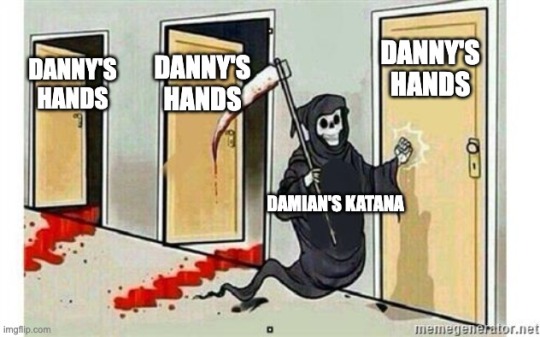
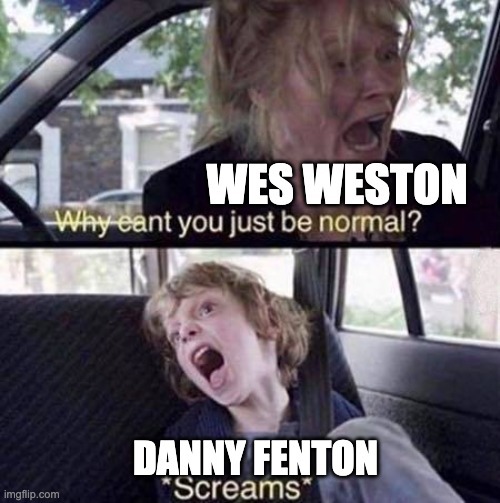



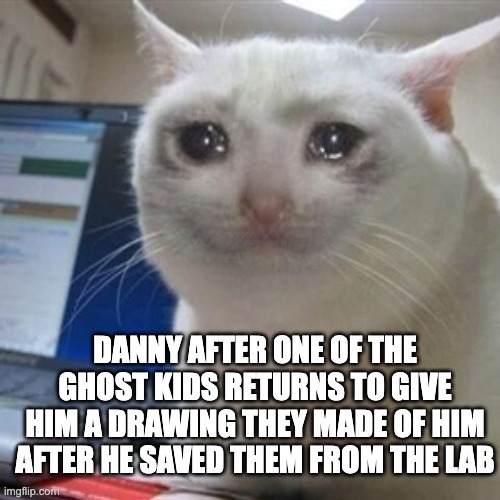

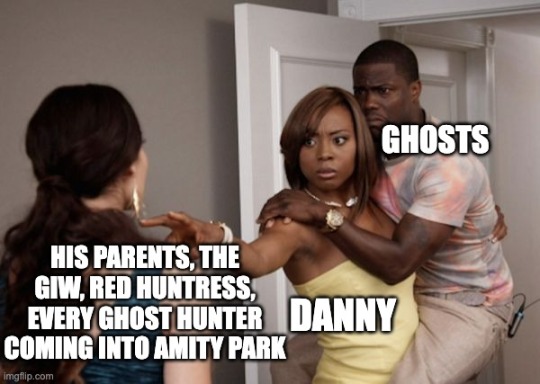

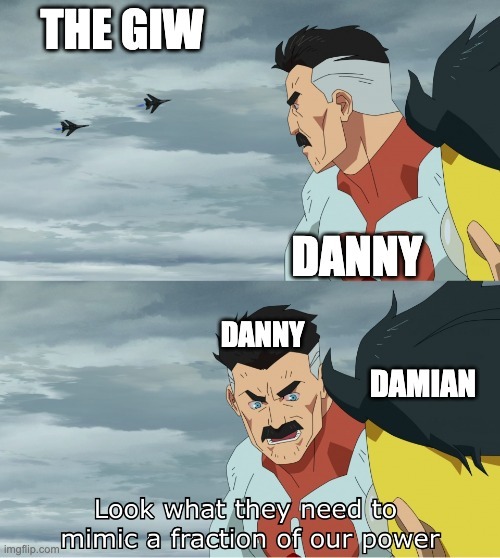
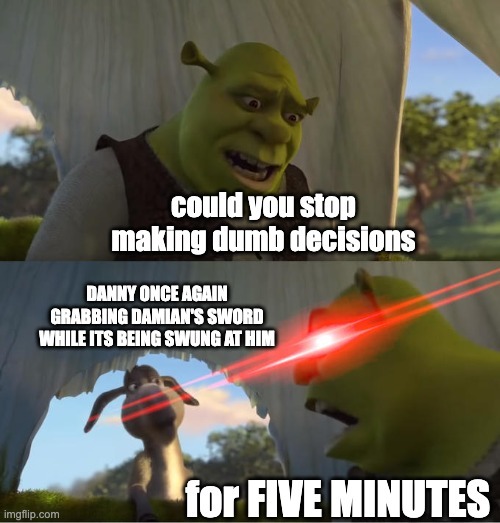

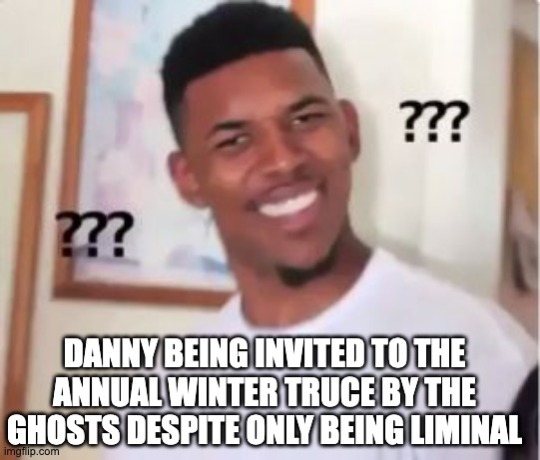
#dpxdc#dp x dc#dp x dc crossover#dpxdc crossover#dpdc#clone^2#danny fenton is not the ghost king#so canon to clone^2 and clone damian the portal that ends up transporting damian to amity park is left pr ambiguous#so really how he got there could be one of many things whether it be through divine intervention or clockwork's doing or hell#it could've also been quite literally the 1 in 1 millionth chance that a natural portal opened up beneath him and sent him to amity#and was a happy accident#but the idea that the laz pits or another adjacent such entity heard damian wanting an older brother (he meant og damian but oops never-#specified) and then sends him to the one person who could fulfill that wish and make him happy at the same time.#was really funny to me within the context of the lilo and stitch meme. the meme can also be seen the other way around with danny as lilo#and damian as stitch. but danny being stitch was infinitely funnier and ~technically~ more accurate imo#danny technically IS a nice angel but also. he's a developing menace to society (just ask wes) and he's going to make damian one too#danny being from the midwest means he has a midwestern accent and thats not something the bats know how to handle when they finally meet hi#hey look at that! my meme making skills are steadily improving. im no longer making the same joke six different times in different formats#those first two images i made a few days ago the rest i made in the last thirty minutes in a spur of clone^2 induced inspiration#and procrastination of writing the cfau rewrite of the first post. we are 10k words deep folks and just barely got past the 1st gala reunio#dunking on the giw is a god-given right and danny WILL pass it down to damian
558 notes
·
View notes
Photo

Color revolutions George Soros and how he pays Loyal Followers March 16, 2022 Herland Report
Color revolutions have resulted in what was effectively regime change in the Republic of Georgia (twice), Ukraine, the Arab World, and Belarus.
It is George Soros, however, who is the dangerous fanatic. He is gunning for you, your property, your children, and ultimately your way of life.
Color revolutions George Soros: Of course you’ve heard the name “George Soros,” often invoked as a sort of folk demon on the American and international right, it’s likely that you have some vague notion of why you think he’s a bad guy, or maybe you think the whole thing is a bunch of hype.
However, if you’re a freedom lover, there’s nothing “hype” about the influence that George Soros has around the world attacking your freedom. Indeed, you probably vastly underestimate the influence that he has on politics.
From the perspective of someone who values life, liberty, and the pursuit of happiness, there is no more dangerous man today than George Soros. This is not hyperbole, it is the simple truth. While we don’t plan to paint a picture of a man standing behind the scenes, rubbing his hands together and cackling as he plays puppet master over each and every attack on freedom around the world, Soros acts as a strawman and a caricature of what is actually going on in the world, writes Sam Jacobs at Ammo.
George Soros, his money, and his NGOs are bankrolling and influencing public policy and opinion from the local level all the way up to the national level. Entire nations have been made to bow to the Soros agenda, but perhaps more importantly for our purposes, key local officials in government are increasingly wholly owned subsidiaries of the Soros machine.
Ever wonder why urban terrorists can burn down cities with no consequences but the McCloskeys are prosecuted for defending their home against the same? The answer is George Soros, his money, and his influence.
-
Do You Know Who Your District Attorney Is?
Color revolutions George Soros: American political culture focuses almost entirely on Presidential elections, with Congressional and gubernatorial races getting much less attention from the general public. When it comes to local politics, unless you live in a large city, chances are good that you don’t know much about city politics. For example: Who is your local district attorney or county prosecutor?
Most people have no idea. It’s a low-key office, generally staffed by someone looking to do public service, not advance their career. There is little glamor, low pay, and lots of thankless work to be done at this level, which means that for the most part, this is not where social climbers begin their careers.
That being said, these elected officials have enormous amounts of power because they decide who gets prosecuted, who doesn’t, and what charges are levied against them. If your DA decides that the local band of looters are actually peaceful protesters, they won’t ever see the inside of a courtroom. Similarly, if the local DA isn’t a fan of the right to self-defense, one must consider this when choosing whether or not to pull your firearm if a mob of them shows up on your lawn.
RELATED ARTICLES:
George Soros and South Africa’s transition from Apartheid to Robbery Capitalism
The World Economic Forum Great Reset leaders listed
Billionaire on global currency speculation, George Soros, a short biography
TV Interview with William Marshall: George Soros and US drug epidemic
Looting of Africa under corrupt African leaders – George Soros Open Society
George Soros understands this and has been quietly funding a campaign to place district attorneys amenable to his agenda across the United States.
The Los Angeles Times – hardly the Epoch Times – describes this as “a years-long campaign by liberal groups to reshape the nation’s criminal justice system.” You should believe them when they tell you this, because that is precisely the goal. Not the litigation of the 10-yard fight that is the minutiae of law in America, but the radical reshaping of the legal system as we know it.
Part of this is just the very nature of bureaucracy, the plainer term for what people mean when they talk about “the deep state.” The government rests on men doing things, chief among these are what Vladimir Lenin called “special bodies of armed men”: cops, courts, and jails. According to Lenin, this is the very essence of the state. Libertarians will sympathize with this definition of the state. At its core, the state is a man with a gun who will throw you in a cage or kill you if you fail to comply. Everything else is just window dressing.
The local prosecutor is a chokepoint in the special bodies of armed men. The attorney general isn’t euphemistically called “top cop” for no reason and in his own way, the local prosecutor is also a “top cop,” albeit with a much smaller jurisdiction. This also means that he has more direct control over the individuals in his district, as the attorney general deals more in broad brushstrokes.
Who is your local DA? George Soros knows. He might very well be his paymaster.The campaigns for local DAs and the like aren’t shy about stoking racial resentment and animosity. The Democratic Party’s playbook hasn’t changed much since the days of Jim Crow, it’s just that it has found new ways to make political hay out of sowing racial divisions among Americans. One Soros-produced ad for Noah Phillips campaign for District Attorney of Sacramento County, focuses almost exclusively on a black boy in a hoodie.
It is of course unrealistic to expect that even highly bureaucratic roles are entirely apolitical, however, the Soros DAs have ratcheted up the partisanship, not just in the race, but in the actual execution of the office. As of September 2020, there were 31 Soros-backed DAs in the United States. That might not sound like a lot, but it includes the DAs of Boston, Chicago, Dallas, Los Angeles, Philadelphia, Portland, San Francisco, and St. Louis. All told, tens of millions of Americans are now victims of the Soros racket in the form of their local top prosecutor.
-
Some examples of the Soros machine at work in America’s DA offices include:
After the last round of rioting, looting, and arson in St. Louis, Circuit Attorney Kim Gardner dismissed charges against all 36 people arrested. She’s on the take from Soros for $307,000. This is also the prosecutor who filed charges against the McCloskeys.
Los Angeles County District Attorney George Gascon got over $2 million from the Soros operation, he ended cash bail and is no longer prosecuting the crimes of trespassing, disturbing the peace, resisting arrest, prostitution, or driving without a license.
Kim Foxx is the Illinois State’s Attorney and has received $807,000 from Soros. She also declined to prosecute rioters, saying “The question it comes down to is, is it a good use of our time and resources? No, it’s not.” Foxx likewise declined to prosecute hate crime hoaxer, Jussie Smollett.
Philly District Attorney Larry Krasner has received $1.7 million from Soros. He won’t be prosecuting rioters, looters, and arsonists. Krasner was very open about the ideology driving his permitting chaos in the city: “Prosecution alone will achieve nothing close to justice—not when power imbalances and lack of accountability make it possible for government actors including police or prosecutors to regularly take life or liberty unjustly and face no criminal or career penalty.”
Krasner is worth calling out for special attention because he filed 75 cases against the police and has represented both Occupy Philadelphia and Black Lives Matter. At his victory party, supporters chanted, “F*** the police! F*** the police!” He generally declines to call himself a “prosecutor,” instead labelling himself a “public defender with power.”
The results in Philadelphia are stunning as charges are dropped in 60 percent of all shooting cases – though we suspect your odds of being a conservative self-defense case and having your charges waived are rather slim. Shootings in Philadelphia were up 57 percent year over year from 2019 to 2020.
San Francisco District Attorney Chesa Boudin, who’s working off $620,000 in Soros money, proclaims that “[t]he criminal justice system isn’t just massive and brutal, it’s also racist.” He doesn’t prosecute crimes such as solicitation, public camping, or public urination, which has certainly transformed San Francisco into a paradise on earth. Homicide rates have increased, burglary cases have increased by 42 percent, motor vehicle theft increased by 31 percent, and arson rates increased by 45 percent. He was formerly an advisor to Hugo Chavez and his parents were members of the Weather Underground, a far-left terrorist organization who directly participated in the robbery of an armored car. His victory party included obscene anti-police chants.
DA Mike Schmidt of Portland, who’s received $230,000 in Soros money, also declined to prosecute rioters who burned the city for months while besieging a federal building. He openly sympathized with the rioters saying that they “represent the instinctive reactions of people who have been gassed repeatedly, who have been struck with kinetic projectile weapons.”
If the Soros machine can capture a District Attorney’s office in San Francisco, which is extremely expensive, there is little preventing them from capturing prosecutorial powers in Omaha, Annapolis, or Colorado Springs – or indeed your hamlet.
-
The Soros Machine and Racial Unrest
Color revolutions George Soros: Much like the Democrat Party he supports, George Soros is not the slightest bit afraid to go into the mud of the politics of racial resentment. The Open Society Foundations are the primary mechanism for Soros delivering money to political activists in the United States and around the world. In 2020, The Open Society Foundations unveiled plans to spend $220 million on “efforts to achieve racial equality in America.”
To show you the relative priority that the Soros machine places on “racial equality” as opposed to electoral politics, the Soros machine only spent $28 million on the Democrat Party in 2020.
When Soros says “racial equality,” he means something very different from what you or the average American means when they say it. What Soros deems “racial equality” might more accurately be called “racial revenge,” though the left prefers to use the term “racial equity.” We will dive more into the ideology motivating Soros later, but our article on the Frankfurt School and Cultural Marxism is also an excellent resource on the deep philosophy of the Soros machine.
-
What Are the Open Society Foundations?
Color revolutions George Soros: It’s important to know how the Soros machine operates so that you can learn to look for it. The Open Society Foundations is the main umbrella under which Soros distributes money. It includes a number of organizations, most of which you’ve probably never heard of and most of which feature very innocuous, even bland-sounding, names. The think tank used to generate the ideology is New America, formerly known as the New America Foundation, the name of which is much more direct about what it intends to create.
So what is an “Open Society?” Well it’s based on a phrase used by Karl Popper, a somewhat obscure 20th Century thinker known best for his “paradox of tolerance,” which essentially says that liberals should stop tolerating diversity of opinion when it begins to threaten liberalism.
Where does the Soros operation put its money in America in order to transform the country into an “open society?” It aims to abolishing the police and invest $1.5 million into the Community Resource Hub for Safety & Responsibility, another one of these blandly named organizations working to undo the American way of life. Additionally, his money has been linked to the urban unrest in Ferguson in 2014. In total he spent $33 million fomenting chaos in the formerly safe suburb of St. Louis.
Of course, no rogue’s gallery of the radical left would be complete without mentioning Black Lives Matter (BLM), another one of these vaguely innocuous-sounding organizations that Soros spends his money on. And boy howdy, did he spend money on BLM – George Soros spent $33 million on BLM alone.
-
What Is the Philosophy of the Open Society Foundations?
Color revolutions George Soros: We’ve seen the modus operandi of the Soros machine, but what is the ideology that motivates it?
Soros’ umbrella organization is The Open Society Foundations. The phrase “open society” is one of those things that sounds so unassailable that no one could be against it. After all, are you for a closed society?
This is the framing trick used by the left since time immemorial. Something vague and innocuous sounding is picked as a name which means something very, very different to those in the know. So what is an “open society” to Soros and his retinue?
It is a concept developed by Karl Popper, Soros’ intellectual hero. Popper was not a Cultural Marxist, in fact he was highly critical of Marxism. However, there is so much overlap in terms of end results that it becomes a distinction without a difference.
Karl Popper didn’t invent the concept of the open society, despite his association with the term and his development of the idea – that dubious honor falls to a Frenchman by the name of Henri Bergson. However, we can credit most of what the open society is understood as today as springing from the mind of Karl Popper.
There are some key takeaways about what an open society actually is. First, the open society is an atomized society. People are to be seen not as part of any kind of social organism, but rather as radically separate individuals. The individual is not an essential building block of society, it is the end to itself. Social norms and traditions are seen as necessarily oppressive.
The open society is hostile to the notion of natural law and instead puts man-made laws, properly called “legislation,” over and above a more natural law flowing from a set of first principles, most notably God. Again, like Cultural Marxism, it seeks to “dethrone God” from society, replacing it with a cult of human judgment.
Popper also believed in a culture of constant critique, this is a point of overlap with Cultural Marxism; and humanitarianism, which is a loaded word designed to sound innocuous, but which actually means something far more specific than “being nice to people.”
Perhaps most frighteningly, the “open society” is just that – open. That is, entirely without any sort of privacy. While the notion of a “right to privacy” as interpreted by United States courts as a justification is troubling in practice, far more troubling is Popper’s conception of a society where every facet of a person’s life is in the public sphere, irregardless of their consent.
Free speech and free elections were seen as a necessity for such a society, however, Popper and the Open Society Foundations had different interpretations for this. Free speech does not apply to opponents of the open society unless they are critiquing society from the left – the only way to complain about Comrade Stalin is to say how much better we would all be if there were but two of him. Similarly, free elections means that of the kind we had in 2020 – one with absolutely no safeguards against abuse and taking place behind closed doors under the supervision of ideologically motivated “monitors” with rampant fraud.
It’s not just in America, it’s a worldwide phenomenon.
-
George Soros: King of the Color Revolution
Color revolutions George Soros: George Soros’ primary weapon for changing countries to be more pliable to his desires is the “color revolution.” You’ve probably heard of revolutions occurring, generally in post-Soviet states, but also elsewhere. They have names like the Yellow Revolution (the Philippines), the Rose Revolution (Republic of Georgia), the Orange Revolution (Ukraine), and the Saffron Revolution (Myanmar).
There are some common themes to a color revolution which are worth noting for those wishing to prevent such a thing from happening in their own country. A disputed election where there is widespread cheating on the part of the “opposition” candidate generally kicks things off. The “opposition” is controlled by the Soros machine and friendly to NATO or other Atlantacist political organizations. There are then street rallies where violent operatives hide in crowds of otherwise peaceful protesters.
The government then responds and there is outcry from “humanitarian” organizations that the government has dealt sternly with what are effectively terrorists using human shields. There are generally operatives within the command structure who are sympathetic to Soros and his allies in Western governments.
There have been mixed success with color revolutions. They fail more often than they succeed. But they do succeed, especially where one defines success not so much as overthrowing the existing government, but forcing it to accept radical concessions that dramatically remake the political culture in the country. Color revolutions have resulted in what was effectively regime change in the Republic of Georgia (twice), Ukraine, the Arab World, and Belarus.
George Soros is deeply embedded in color revolutions around the world through the auspices of his Open Society Foundations NGO. The playbook should look somewhat familiar to most Americans after the summer riots of 2019 and 2020, as well as the aftermath of the 2020 elections.
It’s important to remember that George Soros is not a god. He is simply a man with a lot of money. Thus, we should be cautious in attempting to attribute each and every action on the far left to him, particularly in the view that he is some kind of micromanaging puppet master who is involved in the trenches of making policy or street activism. He is not.
He is a real-world supervillain and he is able to direct the law, constitutional, and political culture of entire nations using his money and his vision for what society ought to look like. He is able to get away with it thanks to general ignorance of just how effective he is and a coordinated effort by the media to smear anyone who calls him out as a dangerous fanatic.
It is George Soros, however, who is the dangerous fanatic. He is gunning for you, your property, your children, and ultimately your way of life.
https://hannenabintuherland.com/usa/color-revolutions-george-soros-and-how-he-pays-loyal-followers/
-
OUR COURTS, CORPORATIONS AND BUREAUCRACIES NEED TO BE AMERICAN AGAIN
DOWNSIZE DC https://downsizedc.org/do-you-have-what-it-takes-to-be-an-agenda-setter/ OPEN THE BOOKS https://www.openthebooks.com/ ELECTION INTEGRITY https://whoscounting.us/ PROTECT VOTER RIGHTS https://www.truethevote.org/ REPLACE YOUR SEARCH ENGINE https://resulthunter.com/ WATCH America Can We Talk https://rumble.com/user/AmericaCanWeTalk LISTEN TO RUDY https://rumble.com/c/TheRudyGiuliani KEEP TRACK OF CONGRESS https://www.govtrack.us/ RESTORE OUR REPUBLIC https://precinctstrategy.com/ FOLLOW RELENTLESS TRUTH https://t.me/relentlesstruth MOMS FOR LIBERTY https://www.momsforliberty.org/ ROOT FOR AMERICA! https://rootforamerica.com/ READ DC CLOTHESLINE https://www.dcclothesline.com/ STOP FINANCING YOUR ENEMY https://rumble.com/vlf56b-former-govt.-official-financial-system-under-attack.html PRAY https://rumble.com/v13n5sd-michele-bachmann-on-roe-v.-wade-the-power-of-prayer.html READ JULIE KELLY OF AMERICAN GREATNESS https://amgreatness.com/author/julie-kelly/ TRUTH FOR HEALTH ACTION PLAN https://www.truthforhealth.org/ YOUR INTELLIGENCE OFFICER https://rumble.com/c/ThePratherPoint
WAKE UP! https://www.warpath.coffee/ promo code warroom
“GIRD FOR COMBAT” PUT ON THE WHOLE ARMOR OF G-D https://godblesstheusabible.com/
KNOW THE POLITICAL LANDSCAPE
https://rumble.com/c/BannonsWarRoom
https://www.youtube.com/c/MahyarTousi
https://childrenshealthdefense.org/fauci_info/
https://hannenabintuherland.com/usa/color-revolutions-george-soros-and-how-he-pays-loyal-followers/
https://rumble.com/user/GlobalTreePictures [Ukraine on Fire]
https://thenewamerican.com/un-agenda-2030-a-recipe-for-global-socialism/
https://www.amazon.com/Color-Communism-and-Common-Sense/dp/B08NWG857L/
https://rumble.com/v13jfmn-2000-mules-discussion-with-guest-dinesh-dsouza-rudy-giuliani-may-4th-2022-e.html
https://2000mules.com/ https://rumble.com/v13v4sv-2000-mules.html
https://www.yorechildren.com/
https://libertyfirstsociety.com/noncompliantmovie/
https://rumble.com/v13qrmt-expert-constitutional-lawyer-jenna-ellis-gives-an-explosion-interview-may-6.html
https://thejennaellisshow.com/
CAMPAIGN https://campaigns.dailyclout.io/campaign/home
ONE CORPORATION AT A TIME - The Great Patriot Protest & Boycott Book
#george soros#open society#open society foundation#election fraud#color revolution#american transnational criminal organization#ukraine money laundering#ukrainian nazis#ukraine bioweapons labs
1 note
·
View note